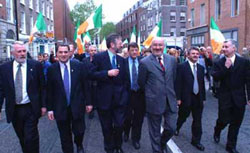 |
Irisch
Republikanische Solidarität
|
 |
TIMETABLE TIGHTENS FOR DEAL
April 10 marks the fifth anniversary of the signing of the Good
Friday Agreement and negotiations are continuing on what could
prove to be another historic agreement.
The talks are seeking to finally implement the Good Friday
Agreement, restore the North's power-sharing political
institutions, and permanently end Direct Rule of the North of
Ireland from London.
The politically-charged policing reform process continued on an
uncertain path last night as the Policing Bill was amended as it
completed its remaining stages in the British parliament
yesterday.
The British government accepted a Liberal Democrat amendment,
supported by the Conservative Party, making clauses of key
importance to nationalists -- concerning the creation of four
separate District Policing Partnership Boards for Belfast and the
disqualification of former prisoners serving as independent
members of these boards -- conditional upon the restoration of
the devolved government in Belfast.
The last-minute amendment adds to the potential veto of the
Ulster Unionist Party leader David Trimble, while increasing the
stakes for talks involving the North's pro-agreement parties and
the Irish and British governments this week.
Dublin's Minister for Foreign Affairs, Brian Cowen, holds talks
with British Secretary of State Paul Murphy in Belfast on Friday
ahead of next Thursday's expected summit at Hillsborough to be
hosted by the British Prime Minister, Mr Tony Blair, and the
Irish Taoiseach, Mr Bertie Ahern.
Meanwhile, it has been reported that David Trimble plans to put
any deal to a meeting of the party's leadership, the Ulster
Unionist Council (UUC), on April 26th. He is said to be seeking
a move by the IRA on a so-called 'act of completion' by April
15th to facilitate a timetable for a UUC decision in advance of
Assembly elections on May 29th.
PARTIES ARGUE OVER POLICING
Sinn Fein negotiators have been pressing hard for policing and
justice reform in line with the original proposals of the Patten
Commission, and are seeking the swift devolution of these powers
from London to Belfast.
The party claimed it was succeeding in closing the gaps on
policing left by its main nationalist rivals, the SDLP.
Responding to attacks this week by SDLP leader Mark Durkan, Sinn
Fein national chairman Mitchel McLaughlin said he was tired of
the former Deputy First Minister claiming credit for "every
advance that has been negotiated on every issue since the signing
of the Good Friday Agreement".
Earlier this week, Mr Durkan claimed Sinn Fein was in danger of
missing the boat unless it agreed to join the North's Policing
Board before the elections scheduled for May 29.
He was speaking after it emerged that a special Sinn Fein
conference would not be held until June at the earliest to follow
for a full internal party debate on any deal reached in
negotiations.
Mr Durkan said: "It seems to me that Sinn Fein want to hedge
their bets through the election. They want to speak with forked
tongue on the policing issue."
Mr McLaughlin accused Mark Durkan of settling for too little at
previous negotiations in recent years, such as those at Weston
Park in the English midlands.
"During Weston Park, Mark was trotted out to complain to the
media about the focus being on the negotiations between Sinn Fein
and the British Government," the Foyle MLA said.
"And when the British Government then brought the parties
together to present them with a `take-it-or-leave-it` package the
SDLP folded and took it."
Mr McLaughlin said that even though the Weston Park package
contained many of the changes Sinn Fein demanded it was still
short of what was required on policing.
"Sinn Fein is filling out the gaps left in policing by the SDLP,"
he said.
At Sinn Fein's annual conference [Ard Fheis] at the weekend,
Gerry Adams told the assembled delegates that a position paper
would go to all levels of the party for discussion, and that
there should also be further ongoing debate within the wider
republican and nationalist community. Sinn Fein should make no
bones about the enormity of the issue, he said.
Sinn Fein's chief negotiator, Martin McGuinness, told the
assembled delegates that talks with the two governments are
continuing and refuted recent reports coming from London and
Dublin.
"Despite the claims by some that the negotiations are closed,
there is no deal done," McGuinness said.
He went on to outline details of the ongoing talks and said the
discussions were aimed at "achieving a plan for the full
implementation of the agreement and to counter any attempts to
filter this implementation through a unionist prism".
"We do not have an acceptable policing service or a
representative criminal justice system," McGuinness told the
assembled audience. "We certainly do not have equality and no one
is going to give it to us. This party will have to fight for this
issue every day."
Letzte Änderung:
06-Sept-03